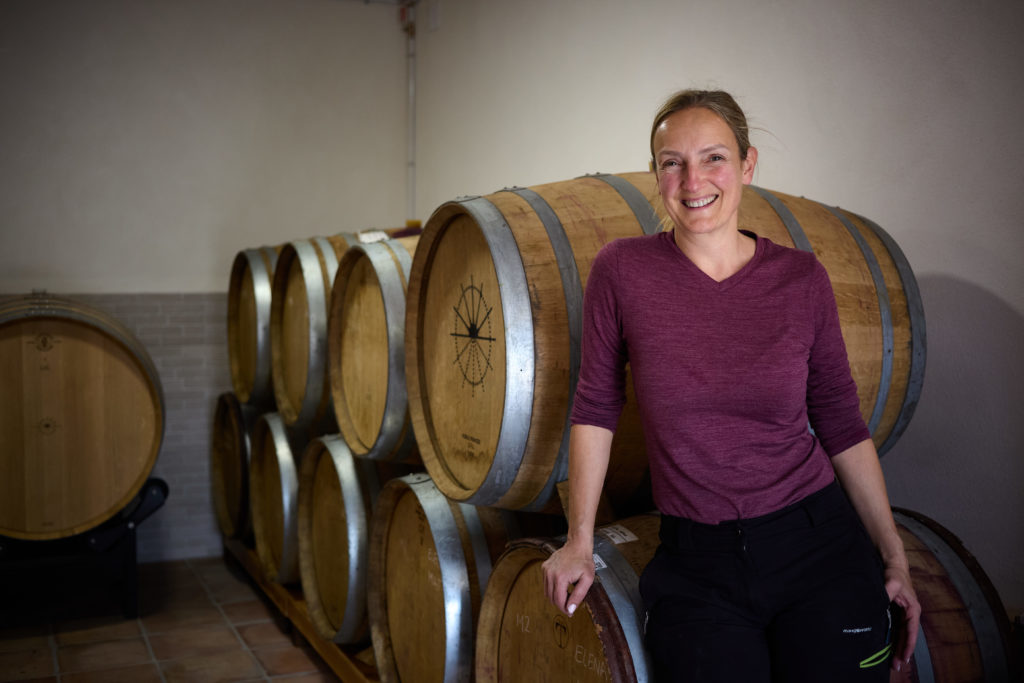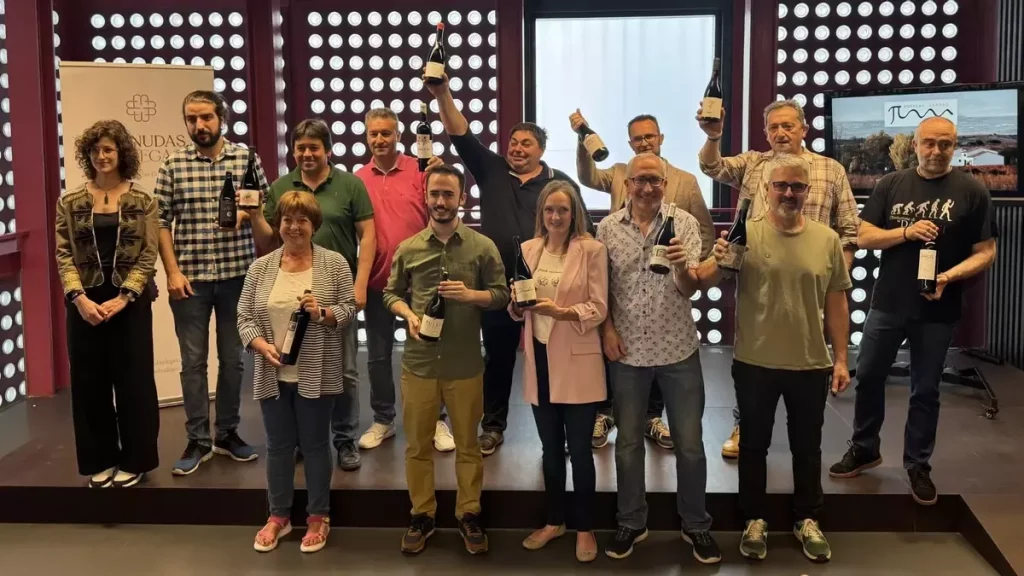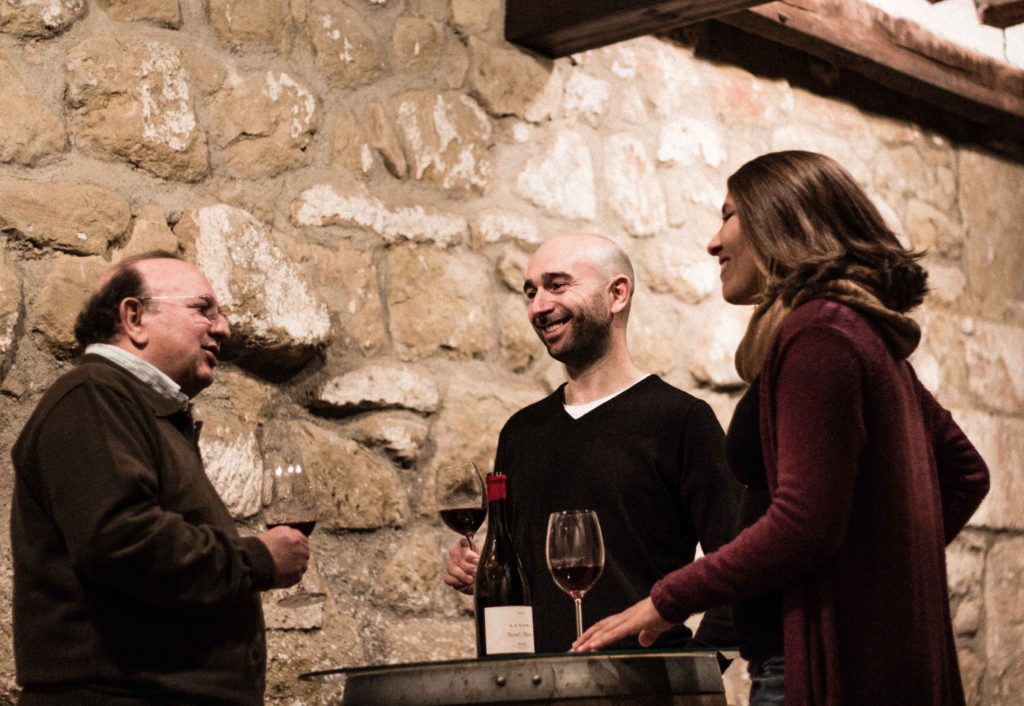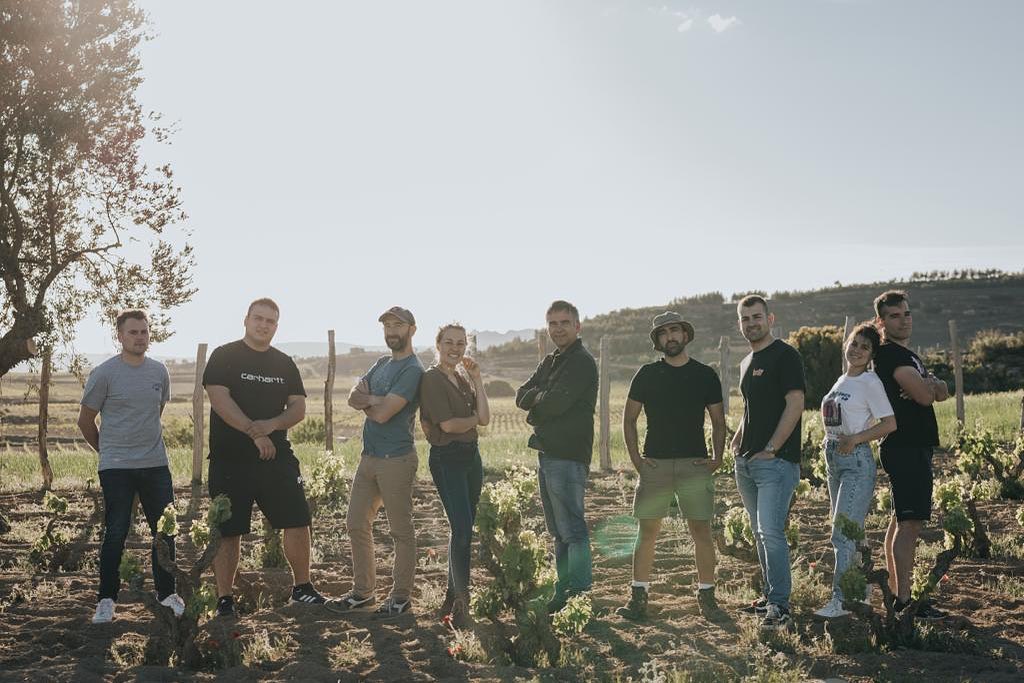Rioja wines today are showing excellent quality and a greater diversity of styles than ever before. This dynamism has been driven to a large degree by wineries owned by a young generation of grape growers and winemakers who have taken over their parents’ properties. These young people, armed with degrees in agronomy and winemaking, with extensive experience gained by working in wineries around the world, are capturing the attention of wine writers, distributors, retailers, restaurants, and consumers alike with their terroir-focused wines.
Two examples of this razor-sharp focus are Elena Corzana and Miguel Merino.
Elena Corzana
Elena Corzana was born in Navarrete in Rioja Alta, a village known not only for its grapes cultivated in red clay soil but for a historical tradition of clay -fired pottery. She learned about viticulture from her grandfather, with theory gained from a degree as an agronomist engineer. After a stint working for Fernando Remírez de Ganuza, at one of Rioja’s most innovative wineries, her thirst for learning about her profession took her around the world, working at wineries in Chile, New Zealand, South Africa and Australia.
After two decades abroad she returned to her native Navarrete to work about 1,5 acres of vineyards from which she crafts intensely personal wines.
Elena states on her website,
Each bottle of wine I craft holds a unique story of passion and dedication. From tending the vineyard to the magic that happens in the winery, every step reflects my commitment to quality and my land. My hands and heart are present in every detail, ensuring that my wines stay true to their authenticity and connection to the roots of Navarrete.
Corzana provides hints about her personal journey in a recent interview with journalist Julio Flor,
You’ve come at a time in my life when I am finally able to express myself as I really am….I’ve been building myself on the inside, traveling a lot, working in different countries, living for five years in Madrid. I’ve always been restless, wanting to learn about other cultures. Now is when I ‘m expressing myself through my origin in Navarrete.
One of Corzana’s emblematic wines is made exclusively from maturana grapes, a native variety “rediscovered” in Navarrete, well adapted to the alluvial clay and ferrous soil around the village.
Corzana makes about 4,000 bottles yearly, an amount that she doesn’t want to increase because her goal is to tend the vineyards, harvest the grapes, make and age her wines herself. Some of her wines are aged partially in clay ‘tinajas’ (jars) made at a pottery works in her native village.
She sums up her philosophy succinctly: “My grape growing is certified ecological, and winemaking very simple based on good grapes, cleanliness in the winery and a flavorful, mouthfilling style of wine “.

Elena Corzana, Navarrete (La Rioja), Spain. Photo: James Sturcke, sturcke.org
Menudas Bodegas
Elena Corzana’s philosophy of “small is beautiful” is shared by eleven small properties scattered throughout Rioja. These wineries have joined forces to create Menudas Bodegas (tiny wineries) whose name has a second meaning when pronounced emphatically. “Menudas bodegas!” can be translated as “Wow! What wineries!”
In Elena Corzana’s words, “Menudas Bodegas was founded to provide relevance to wineries that many people didn’t even know existed. We are preserving family patrimony by caring for special old vines that have been passed down through generations. We make our wines from those grapes in old cellars, underground caves or houses in villages.
In each of these tiny wineries, the same person tends the grapevines, makes the wine and sells it. And to be able to do this well, we necessarily must be small and capable of handling all the details.
We defend quality, closeness, and rural life.”
Menudas Bodegas are independent companies, but they promote their brands together to give them more visibility. This collective effort is working because not only the wineries, but the group are attracting the attention of movers and shakers in the wine trade as well as garnering recognition from consumers.

Photo: Menudas Bodegas.
Miguel Merino and Erika Dubaele
Miguel and Erika are carrying on the tradition founded by Miguel’s late father, himself an innovator in Rioja.
Miguel says,
“Bodega Miguel Merino. A small family winery in Briones in Rioja Alta that makes about 50,000 bottles a year from vineyards exclusively from this village. Since 2024, all of the vines are in the process of ecological vineyard certification”.
One of Miguel’s wines, La Quinta Cruz, is one of the few Riojas made exclusively with mazuelo grapes from a single plot on the slopes of Mount Calvario near Briones. Inside Rioja tells the story of the genesis of this interesting wine:
“Lars Torstenson, who had become the director of Domaine Rabiega, (Sweden’s) Vin & Sprit’s winery in Provence, was experimenting with carignan (a synonym for mazuelo), so they (Lars and Miguel) decided to make a 100% mazuelo, Rioja’s first. It became popular in Spain because of a listing at Andoni Luis Aduriz’s two Michelin-starred Mugaritz near San Sebastian where it was paired with dishes that defied pairing with other wines. Quinta Cruz gained notoriety internationally, too as Decanter magazine’s “Best Old World Red” in 2007.”
Merino makes two other single vineyard wines: La Loma from a 3,4 acre plot planted to tempranillo and garnacha, and La Ínsula, a tiny pre-phylloxera plot planted to garnacha.

Miguel Merino, father and son, and Erika Dubaele. Photo: Bodega Miguel Merino.
Martes of Wine
A play on words from ‘Master of Wine’, MW is a group of friends who all grow grapes from the Sonsierra area of Rioja Alta. For ten years this group has met on Tuesdays (martes) to taste wines blind. Each member has to bring a bottle of wine, and the only rule is that the wines cannot be from anybody belonging to the group. It is an open group, and guests often attend (as long as they bring a bottle of wine). As the group has become better known, so too are their founding members – Miguel Eguíluz of Bodegas Cupani in San Vicente de La Sonsierra, José Gil and wife Vicky from Bodega José Gil in San Vicente, Ricardo Fernández from Bodegas Abeica in Ábalos, Álvaro Loza from Briñas and Miguel Merino. “The Seventh Beatle” as Miguel Merino says, is Iván Sánchez, the sommelier at the Michelin-starred Venta Moncalvillo.

Photo: Martes of Wine (IG @martesofwine)
The future of terroir-based wines
One might ask if small, terroir-focused wines have any chance of success at a time when the wine business is suffering from a drop in sales as baby boomers (born between 1946 and 1964), the mainstay of wine consumers have stopped drinking or are drinking less and young consumers aren’t convinced about wine as a lifestyle choice.
One would think that attracting new consumers to wine would be the task of large winery groups that have the resources to create attractive products.
Not so, says Randy Caparoso, in his blog The Wine Clarion:
“Terroir, if anything, is a concept related to two of the pillars of today’s wine marketing strategies:
- Authenticity, because more and more consumers want wines that are real.
- Sustainability, because many of the younger consumers of adult beverages identify this qualification as key to their personal value system.
Simply put, wines with sense of terroir are more likely to be perceived as authentic and sustainable; certainly far more than the commercialized wines of the big production companies who continue to dominate the market.”
With their terroir-focused approach and dedication to authenticity and sustainability, Corzana, Merino, Menudas Bodegas and Martes of Wine are squarely on the right track.
Text by Tom Perry, Inside Rioja.
Featured photo: Regulatory Council of the Qualified Designation of Origin Rioja.
Learn more about Bilbao-Rioja Great Wine Capitals.